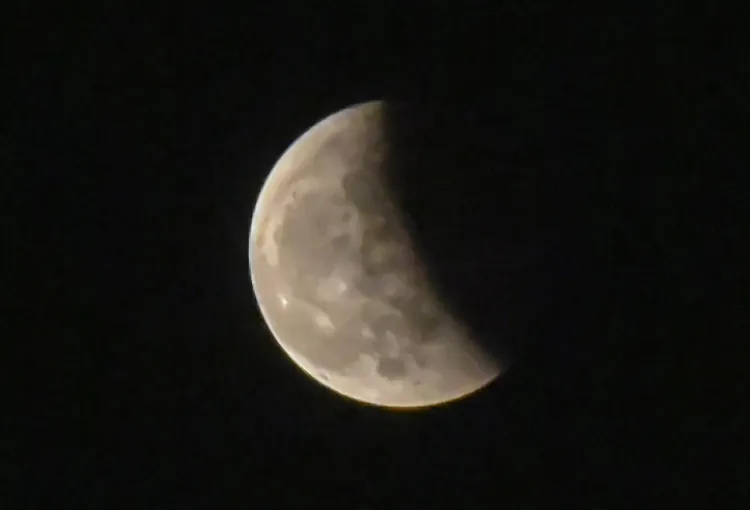Is the Lunar Eclipse on September 7 a Stunning Celestial Event?

Synopsis
Key Takeaways
- The lunar eclipse on September 7 is the longest of the year.
- It is safe to view the eclipse with the naked eye.
- The total phase will peak around 11:42 p.m..
- The Moon may acquire a brick-red hue during totality.
- It’s a fantastic opportunity for photography and stargazing.
New Delhi, Sep 5 (NationPress) The lunar eclipse occurring on Sunday, September 7, will showcase a rare celestial alignment, according to a prominent astronomer.
This event, observable throughout most of India, will be the longest eclipse of the year and is anticipated to ignite significant interest from both rural and urban communities.
In an interview with IANS, Arvind Paranjpye, Director of Nehru Centre Planetarium in Mumbai, highlighted that this will be a total lunar eclipse commencing at approximately 8:58 p.m.
The total phase, during which the Moon is entirely enveloped by Earth’s shadow, is set to begin close to 11 p.m. and will reach its zenith at 11:42 p.m.. The eclipse will continue well into the night, concluding around 1:26 a.m.
"This is a prolonged eclipse. At its peak, the Moon will appear quite dark and may even exhibit a brick-red tint," Paranjpye explained to IANS, noting that this color shift occurs due to the scattering of blue light by Earth’s atmosphere, allowing red light to illuminate the lunar surface.
He emphasized that while astrology often links lunar eclipses to fortunate or unfortunate outcomes, the scientific perspective treats them as purely natural phenomena.
"There’s no reason for anxiety or superstition. Unlike solar eclipses, no special filters are needed to observe a lunar eclipse. It is completely safe to view with the naked eye," he remarked.
Reflecting on his experiences, Paranjpye recalled remarkable past eclipses, including one in the 1970s when volcanic ash caused the Moon to appear to vanish entirely for a brief period.
"Such experiences remind us that eclipses are among the most breathtaking celestial occurrences one can witness," he stated.
He urged everyone to appreciate this phenomenon, capture photographs, and treasure the memory.
"If the skies are clear, it will be a fantastic chance for all in India to experience one of nature’s grand spectacles," Paranjpye added.
The lunar eclipse on September 7 is the final one of the year and is hailed by astronomers as one of the most significant celestial events of 2025.









